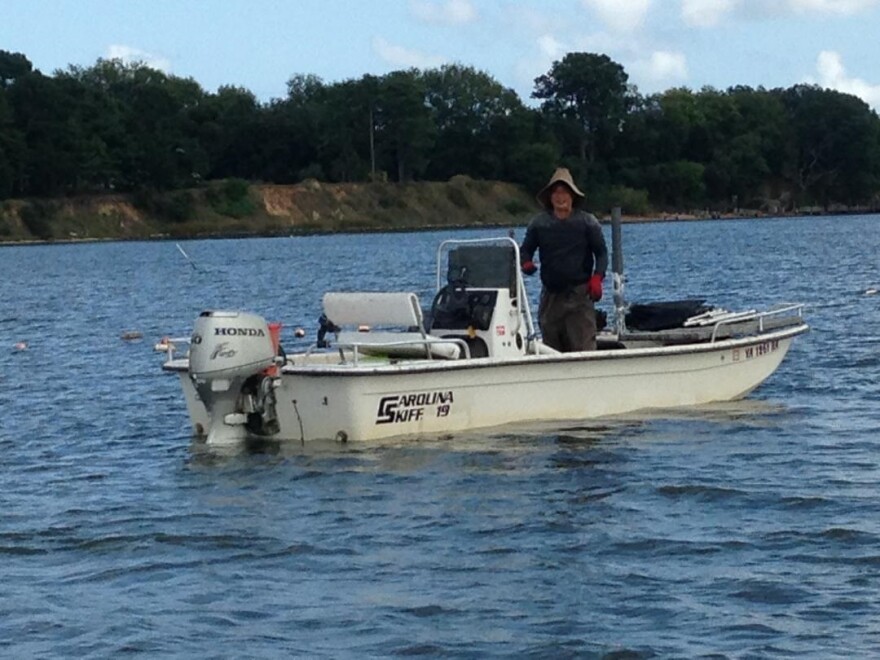Virginia’s seafood industry is one of the oldest in the nation, valued at over half a billion dollars. We’re the fourth largest producer of finfish and shellfish – behind Alaska, Louisiana and Washington State.
The Commonwealth keeps an eye on watermen to prevent over-fishing and assure food safety for consumers. On the front lines, a force founded in 1875 as the Oyster Navy.
On a chilly afternoon, Officers David Drummond and Marshall Reedy are on board their patrol boat -- keeping an eye on those who are fishing or collecting shellfish from Virginia’s Atlantic Coast and the Chesapeake Bay.
“How you doing?” Drummond calls out to a man who barely speaks English. He needs a license and a permit to harvest oysters, but he tells the officers it’s in his car. Drummond lets him off with a warning.
“Make sure it’s on the boat with you when you’re out here, okay?” says the officer. “Alright,” the man replies. “Take care,” Drummond calls as he motors away.
Marine police also enforce federal, regional, state and local rules and catch limits. Those in search of striped bass, for example, can take just two a day, and fish under 20 inches must be thrown back to avoid tickets and significant fines.

“Ultimately it’s up to the judge,” Drummond explains. “Say you have an undersized flounder – the judge is going to give him $50. What gets you in Virginia is the court costs. They average $86-$126. That can be an expensive fish!”
Likewise there are limits on how many shellfish you can harvest, and each bivalve must be tagged with a small plastic tie.
“Prior to leaving the place of harvest they have to affix a tag that gives the location of the harvest, the number of bushels harvested – whether it be clams and oysters -- the date, the time, and that’s just to track the shellfish later down the road if someone were to get sick or we had problems,” he says.
In warmer weather, Drummond adds, shellfish must be shaded and put in a certified refrigerator by a certain time each day.
When they’re not busy with food safety, licenses and permits, there are other jobs for Virginia’s 78 marine officers. They conduct search and rescue operations, enforce boating safety laws, investigate accidents or criminal activity, and provide security for the military, shipyards and nuclear power plants.

“Like all agencies our biggest problem is we are very understaffed,” says the marine patrolman, “It’s a large area to cover – especially when you’re speaking of bayside and seaside, but we do the best we can.”
One place they don’t patrol is Richmond, where state lawmakers reserved the right to regulate one of the 50 species commercially harvested in the Commonwealth. Menhaden are small fish eaten by marine mammals, sea birds and bigger fish. A regional commission limits the catch – giving Virginia nearly 80%, and a company called Omega takes 90% of that to make fish oil supplements and fish meal for pet food and farm animals. Mike Avery, President of the Virginia Saltwater Fishing Association, says not enough menhaden are left for wildlife:
“The species we’re targeting, that’s what they survive on, and if there’s less for them to eat here, they’re not going to stay here,” Avery argues.
His group, which lobbies for anglers, asked lawmakers to reduce the catch, but politicians who’ve taken $450,000 from Omega over the last decade refuse.
“We can’t get any bill out of a subcommittee!” he says. “We’ve never had a bill show up on the actual house or senate floor, despite us going up there and raising all kinds of cane. They take campaign contributions right from Omega, and every vote goes right along – we’re protecting Omega.”
Regulation is also complicated by a changing climate that leads fish to move north in search of cooler waters. That makes it more difficult for scientists to assess populations and set limits on fishermen. In our next report, what consumers can do to assure sustainable fisheries.
This report, provided by Virginia Public Radio, was made possible with support from the Virginia Education Association.


